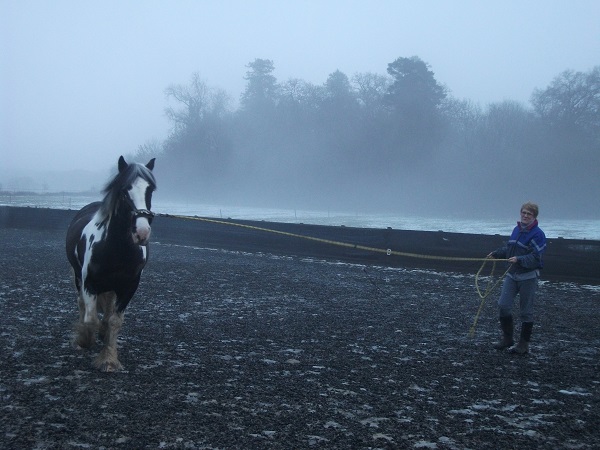
In all principles in horse training the one I like to harp on is the principle of “kindness.” Instinctively, most understand the kindness thing. After all, why be cruel to your horse. Even though that’s a given, that’s not the principal reason I preach about being kind to your horse. When I say “treat your horse with kindness” the importance in training is this: When a horse does as you ask, he should be rewarded with kindness such as a caress on the point of shoulder or forehead. The thing a lot of people don’t get is kindness with punishment. (When I say punishment, I don’t mean whipping or hitting a horse. Punishment “only” refers to negative reinforcement which can be as light as an abrasive tone of voice.)
When a horse needs corrected through negative reinforcement then it’s my practice to almost immediately follow up with kindness such as caressing. The reason is to keep a horse’s confidence up and principally to reinforce you’re still his buddy…even though he did something wrong. Here’s a good story that’ll reinforce my point. Several years ago, I moved into another house. My son and I went to get it ready for the move in. At the time, he was around 3 years old. While I was cleaning parts of the house he was running about. We were just about ready to leave when I noticed the carpet didn’t look right in my bedroom. I checked it out and found paint had been spilled on it. It was wet and fresh. Upset, I called my son in the bedroom and angrily asked, “Did you do that??!!!” After hearing my tone, he knew he was in trouble. He was nervous. (Hmmm, just like a horse) Then I said, “I’m mad at you for doing that!” Within seconds he started crying. It broke my heart that I had broken his. Immediately and with extreme compassion and heartfelt words I said, “I’m not mad at you anymore.” The crying ceased in a few seconds except for the occasional gasps of air he needed to settle himself.
The lesson was, he needed to know he made a mistake but more importantly he needed to know I still loved and approved of him. Had I not countered the negative reinforcement, I think it would’ve been harmful down the road. And that’s how I see it with horses. You should make sure they’re loved and approved of even if they “spilled the paint.” For if they continue to feel uneasiness, it will be harder to train them. But one must be careful in timing the kindness because you could reinforce the wrong behavior. For instance, if you go to catch your horse and he runs from you but finally lets you catch him… and then when you catch him, pet him, then say “Good boy” you teach him to run from you. Why? Because he learns he’ll get petted and told he’s a good boy “after” he runs from you and later gets caught.
Provided by Andy Curry
Related Articles & Free Email Newsletter
Debunking 6 Common Horse Myths
Foods That Are Not Safe or Good for a Horse
How to Deal with a Horse That has Rolled into a Cast Position


Comment here